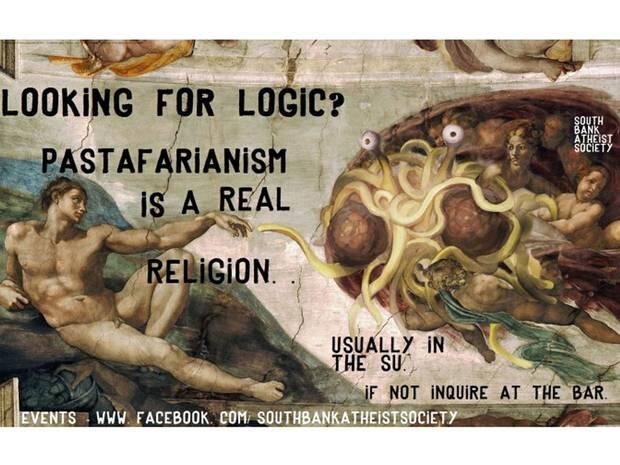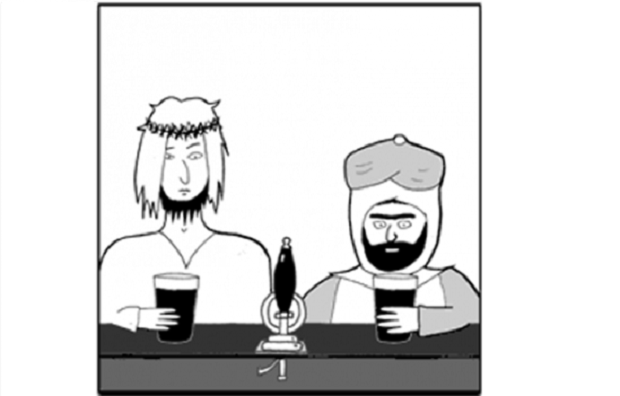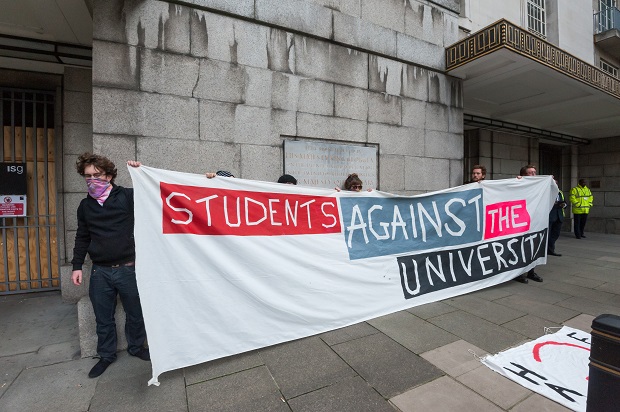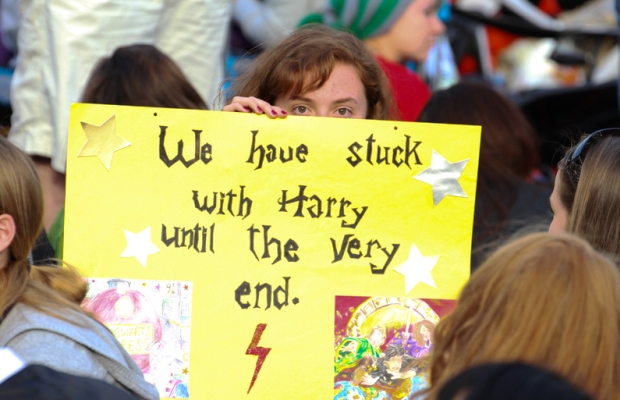12 Feb 2014 | Academic Freedom, News and features, Politics and Society, Religion and Culture, United Kingdom
1. The Flying Spaghetti Monster

The poster, used by the London South Bank University’s atheist society, was banned by student union officials (Image: DavidPWFreeborn/Twitter)
In the most recent incident of student-orchestrated censorship, a poster promoting a university society, which depicts God from Michelangelo’s famous Creation of Adam as a flying spaghetti monster, has been banned from public view.
Members of London South Bank University’s atheist society put up the poster last week as part of a freshers’ fair stall; it was later reportedly removed by student union officials for being “religiously offensive”, with the society’s stall taken down the following day.
The Church of the Flying Spaghetti Monster has been used by atheists as a satirical way of criticising beliefs in a supreme being, first appearing in American schools in 2005. The anti-religious statement has since caught on at British universities.
2. ‘Jesus and Mo’ t-shirts

Members of the London School of Economics atheist society were told to cover up their t-shirts depicting the cartoon ‘Jesus and Mo’ during a freshers’ fair. (Image: AuthorJ&M/Twitter)
Another atheist society, another fresher’s fair, and another case of a university smothering the free speech of its students. This time, members of the London School of Economic SU Atheist, Secularist and Humanist Student Society were banned from wearing t-shirts depicting images from the controversial ‘Jesus and Mo’ cartoons in October 2013.
According to members of the society passers-by had complained to SU staff about their t-shirts and several pieces of literature. They were told by a member of the LSE Legal and Compliance Team and Head of Security said that the t-shirts could be considered “harassment”, as it could “offend others” by creating an “offensive environment”. The t-shirts were unwillingly covered up.
In response to the fiasco the creators of the cartoon produced a new comic strip. The university also made a public apology in December.
3. Robin Thicke’s Blurred lines

Robin Thicke’s Blurred Lines song has been banned in at least 20 student unions after it was released in March 2013. (Image: George Weinstein/Demotix)
First it was the University of Edinburgh, then Leeds University followed suit. Now, around 20 university student unions across the UK have banned the playing of Robin Thicke’s song Blurred Lines .The chart-topping hit, featuring Pharrell Williams, T.I., and an original music video deemed too risqué for YouTube, has been accused of being “rapey” and includes the lyrics “Talk about getting blasted, I hate these blurred lines, I know you want it, but you’re a good girl, the way you grab me, must want to get nasty.”
The Guardian might be on the right track with their claims of Blurred Lines being the most controversial song of the decade but should universities really be allowed to dictate what their students listen to?
4. People

George Galloway attends an anti-war rally in 2011 (Image: Paul soso/Demotix)
It’s not just posters and protests that have been banned by universities- in some instances people, usually those scheduled to speak at a university-held event, have been informed it would not be acceptable for them to participate. For instance, an invitation for MP George Galloway to speak at an event by the University of Chester Debating Society was revoked by the student union under the National Union of Students’ No Platform policy . Galloway had recently been involved in several controversial incidents, including refusing to debate with an Israeli Oxford University student during a panel discussion panel as well as referring to the Julian Assange rape allegations as merely “bad sexual etiquette”.
Several other speakers have been denied attendance to university lectures and debates.
5. Student protest at London universities

Students defy the protest ban imposed by the University of London to speak out against the privatisation of university support services. (Photo: Peter Marshall/Demotix)
Although not a ban implemented by a student union, as of December 2013 at least four London-based universities have banned student protests on campuses for six months. The offending universities- University College London, the School of Oriental and African Studies (SOAS), Birkbeck and the London School of Economics- announced that any students found holding sit-in protests in an area of Holborn, which includes a student union and the buildings of SOAS and Birkbeck, would face imprisonment.
The injunction on student protests by the University of London was passed by the High Court in-light of violent clashes between students, disputing the proposed privatisation of university support services, and police at the beginning of December.
UPDATE: London South Bank University have issued an apology for removing the South Bank Atheists Society’s posters of Flying Spaghetti Monster. Full story at the British Humanist Association
This article was posted on February 12, 2014 at indexoncensorship.org
11 Feb 2014 | Comment, United Kingdom

A dangerous religious fanatic, yesterday (Image Demotix/David Mbiyu)
Last weekend, I appeared on the BBC’s The Big Questions, the Sunday morning religion and ethics show that airs at precisely the time Christians should be at church services.
The Big Question I’d been hauled in to address was whether there were any topics that were too sacred for humour – a variation of the old “where do you draw the line?” which has been in the news quite a bit of late, with the Jesus and Mo cartoon controversy (which started with The Big Questions), the attempt in Northern Ireland to ban a Reduced Shakespeare Company play based on the Bible, and the banning of demagogic French comic Dieudonne from the UK.
As it turned out, we barely discussed any of these specific topics, but rather kept to what could now almost be called the traditional touchstones in these conversations: Motoons and The Life Of Brian.
The discussion was disappointingly calm, but I did, I think, manage to get one crucial point across, one I’d been meaning to bring up since discussing the RSC ban in Northern Ireland.
In the context of religion, censorship is increasingly, simply, about control. Specifically, who is in charge of the sacred text.
At the height of the Rushdie Affair, Christopher Hitchens noted that it represented a war between the ironic mind and the literal mind. This was particularly apparent when watching Free Presbyterian preacher David McIlveen discuss the Reduced Shakespeare Company’s abridged Bible spoof. McIlveen could not, and would not understand the idea that his interpretation of a text was not the only one. Speaking on the Nolan show, he repeatedly suggested that the RSC was presenting a false version of the “Word of God”. Of course, to an extent, they were, but McIlveen seemed to confuse interpretation with, well, lying.
I was reminded of this while reading an exchange between Alex Clark and Stephanie Merritt in the Observer last Sunday.
They were discussing JK Rowling’s view that in hindsight, she would not have had Hermione and Ron, two characters from her Harry Potter series, ending up romantically entangled. Merritt and Clark debated interestingly on authorship and ownership, particularly in the age of fan fiction.
A lot of people are very emotionally attached to the Harry Potter stories, and no doubt some were genuinely unhappy with Rowling’s suggestion that well, the sacred text may be wrong after all. Even her position as creator of that particular universe did not leave her immune from criticism. As Merritt – a historical novelist whose own hero is heretic Giordano Bruno – notes: “I can see why fans felt insulted. They’ve made an emotional investment in those characters and in the storyline as it exists.”
It’s unlikely that Rowling will revise the tale of Hermione and Ron’s romance, but, considering it’s quite possible that at some point, Potterism will become a religion (if grown adults are playing Quidditch, we’re probably half way there), then it’s worrying that Rowling has already introduced a potential point of schism. Do you believe in the true text? Do Ron and Hermione belong together? Or do you believe what the great transcriber of Potterism, Ro-Ling said, that they weren’t suited and maybe split after a fling. Should Hermione even have ended up with Harry?
This could be worse than anything Northern Ireland has seen.
This article was published on 11 February 2014 at indexoncensorship.org
21 Jan 2014 | Comment, United Kingdom

Maajid Nawaz
Maajid Nawaz, former Islamist and current Liberal Democrat, is facing the fearsome wrath of a Change.org petition after he tweeted a frame of a “Jesus and Mo” cartoon on Sunday.
Nawaz tweeted the picture after a discussion about the cartoons on BBC’s The Big Questions. The BBC had declined to show any of the cartoons, which depict Jesus and Muhammad as friends, usually chatting in a bar.
Anyway, there is now a petition calling for Nawaz to be deselected as Liberal Democrat parliamentary candidate for “Hamstead (sic) and Kilburn”, “ because of the offensive images he posted on FaceBook/Twitter of the Prophets Muhammed and Jesus peace be upon them”
The petitioners claim that the Jesus And Mo cartoons feature the two in homoerotic scenes, drinking, swearing etc. In fact, for people who are shocked – SHOCKED! – by the portrayal of Muhammad, they seem to have spent a lot of time looking at portrayals of him.
Ultimately the issue is that orthodox Sunni Islam prohibits any portrayal of the prophet (or any other of God’s creations, for that matter), and hence the cartoons are blasphemous, or “offensive”, as we now call it.
Well here’s the problem. In their description of Jesus as a “prophet”, they’ve in fact committed an extreme blasphemy against the Christian faith, which holds that Jesus is divine. People used be executed for denying Christianity. People used to be executed for less.
If the petitioners are serious in their concern about offence, they should apologise to Christians immediately.
But of course that would be ridiculous. The alternative would be to carry on believing what they believe, and not spend their time seeking out offence. Crazy, but it might just work.







